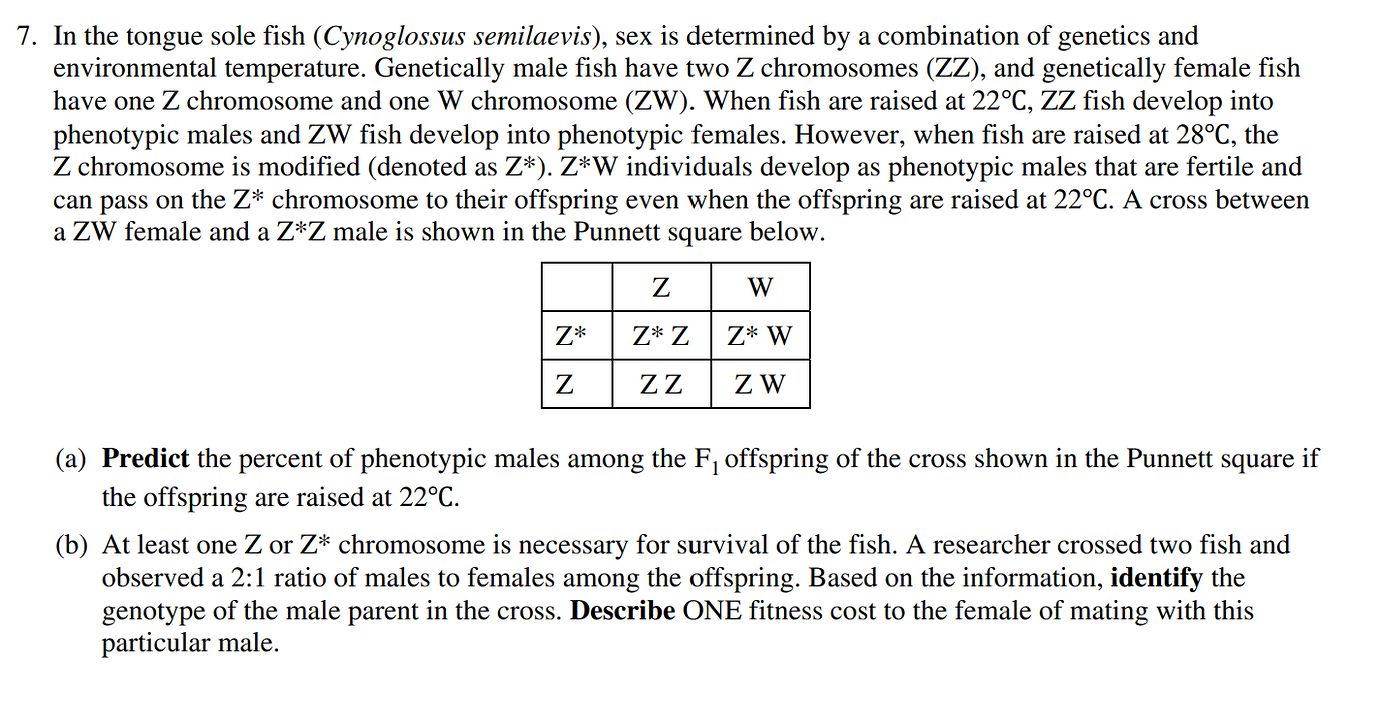AP Biology
Unit 5 FRQ (Phenotypes) with Feedback
4 min read•july 11, 2024
Caroline Koffke
Caroline Koffke
AP Bio Free Response Question for Phenotypes
Be sure to read carefully, and notice how this pattern of inheritance is different from our own.

Sample Answers and Feedback
Practice Submission 1
(a) If the offspring are raised at 22 degrees Celsius, then 75% of the offspring will be phenotypic males. (b) The genotype of the male parent is ZW. One fitness cost of mating with this males would be the 25% chance that of their offspring would not survive, as they would lack a Z or Z chromosome.
Teacher Feedback
Practice Submission 2
(a) 75% among the F1 offspring raised at 22 degrees Celsius are phenotypic males (b) The genotype of the male parent in the cross is Z*W. One fitness cost to the female of mating with this particular male is less offspring will be produced.
Teacher Feedback
Good work on your response. You received 2/3 points. In order to receive the third point, you needed to be more specific on the fitness cost to the female. This could come by mentioning that 25% of the offspring would not survive. Nice work
Practice Submission 3
(a) 75% is the percent of phenotypic males among the F1 offspring of the cross because ZZ, ZZ, and ZW will all be male out of the 4 possibilities. (b) The genotype of the male parent in the cross would be ZW because when that male, who has a W, mates with a female (ZW), the WW will cancel out and not be of any use, thus providing the required 2:1 ratio. One fitness cost for the female would be that at least one of the offspring might have the ZW genotype and this would cause them to change into male. Also, the female might lose 25% of her children since WW is bound to have no offspring, which decreases 1/4 of the possibilities.
Teacher Feedback
Good work on your response. You would receive 2/3 points for this answer! You successfully determined the percent of phenotypic males and wrote up a fitness cost for the second cross. However, the phenotype of the male in the second cross would be Z* W. Good work
Practice Submission 4
(a) If the offspring are raised at 22 degrees but because the allele is already modified the percent of males in the F1 generation would be 75 percent. (b) The males genotype would have to be Z*W. One fitness cost would be that one of the possible offspring would have a zero percent chance of surviving as there is no Z chromosome.
Teacher Feedback
Practice Submission 5
(a) I predict that 75% of F1 offspring will be phenotypic male. (b) The genotype of the male parent is Z*W. One fitness cost is that each offspring have a 25% chance of not having any type of Z chromosome, which would make the offspring have a 0% chance of survival.
Teacher Feedback
You received 3/3 points for this response! You successfully predicted the percent of phenotypic males, the genotype of the male parent, and explained a correct fitness cost. Great work!
Practice Submission 6
(a) If the offspring are raised at 22℃, 75% (3/4) of the F₁ offspring will develop into phenotypic males.
(b) The genotype of the male parent in the cross is ZW. One fitness cost to the female fish when mating with this particular male would be that there will be a 25% (¼) chance of an offspring receiving no Z chromosome but two W chromosomes instead. Without the inheritance of at least one Z or Z chromosome, the offspring of the tongue sole fish will not be able to survive. Therefore, out of all the possible offsprings produced from the mating of a ZW male tongue sole fish and a ZW female tongue sole fish, one-fourth (25%) of its offspring (those that receive a WW chromosome) will have no chance of survival and so they will die off. Edit: Correction to part b): genotype is ZW. The asterisk didn’t show up for some reason.
Teacher Feedback
Thank you for sharing your response. You received 3/3 points for this question by identifying the 75% frequency, the Z*W genotype, and the 25% chance of nonsurvival with the second cross. Nice work
Practice Submission 7
A. 75% of the offspring would be phenotypic males. B. The male parent’s genotype would be z*w. One fitness cost to the female would be that they would have a 25% chance (per child) of producing an offspring with no z chromosomes. Without a z chromosome the offspring will not be able to reproduce and pass on its genes.
Teacher Feedback
Great job on your response. You received 3/3 points